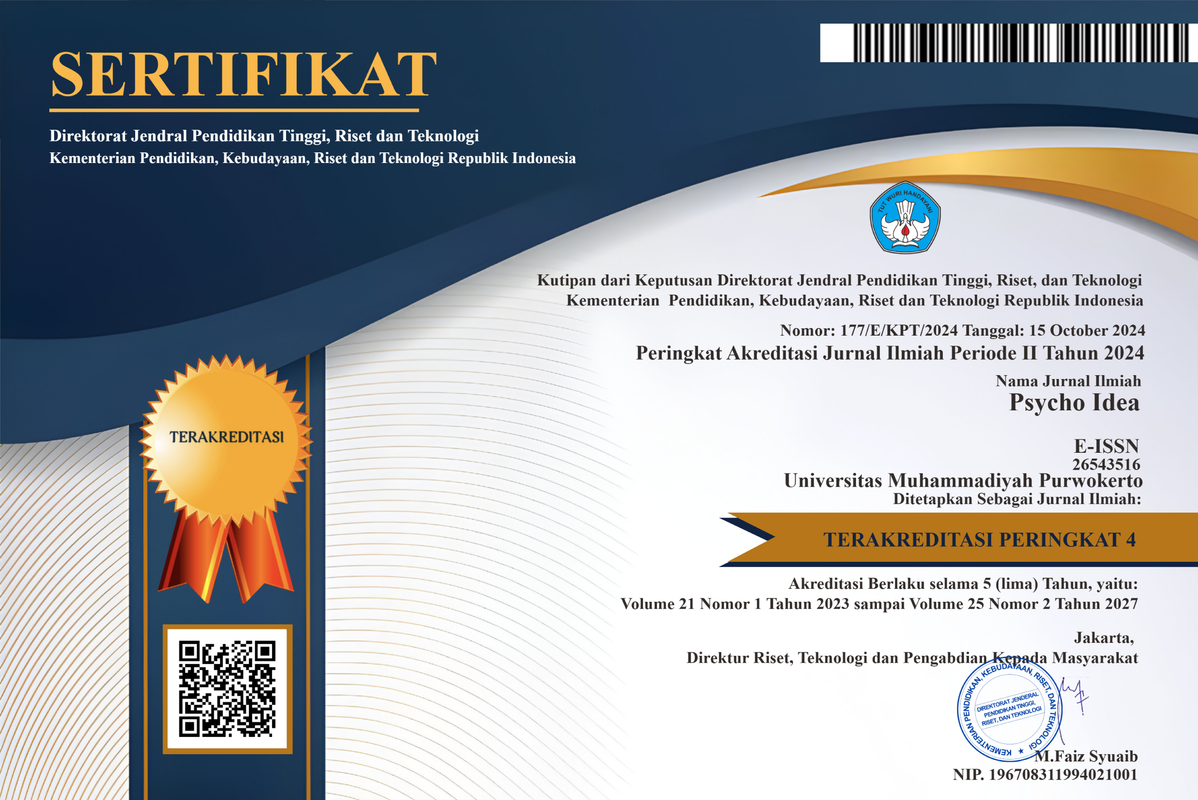PENGARUH ATRIBUSI KESUKSESAN TERHADAP KETAKUTAN UNTUK SUKSES PADA WANITA KARIR
DOI:
https://doi.org/10.30595/psychoidea.v9i2.245Abstract
Tujuan penelitian ini adalah untuk mengetahui pengaruh atribusi kesuksesan terhadap ketakutan untuk sukses (fear of success atau t-sukses) pada wanita karir. Subjek penelitian ini adalah para karyawan dan karyawati swasta, yang berumur antara 20 tahun sampai dengan 50 tahun, dan berpendidikan minimal sederajat SMU. Jumlah subjek penelitian sebanyak 149 orang, yang terdiri dari 84 orang karyawati, dan 65 orang pria (sebagai subjek pembanding). Penelitian ini menggunakan dua angket untuk mengungkap variabel atribusi kesuksesan dan variabel t-sukses, serta menggunakan t-test untuk penguji hipotesis dan ANOVA faktorial dua jalan (atribusi kesuksesan x jenis kelamin) sebagai tambahan analisis. Hipotesis penelitian yang menyatakan bahwa kelompok wanita karir yang memiliki atribusi kesuksesan eksternal akan lebih mempunyai t-sukses dibandingkan kelompok wanita karir yang memiliki atribusi kesuksesan internal, ternyata tidak dapat dibuktikan secara emperis. Dalam penelitian ini diperoleh kesimpulan yang sebaliknya, yaitu kelompok wanita karir yang memiliki atribusi kesuksesan internal yang lebih mempunyai t-sukses dibandingkan kelompok wanita karir yang memiliki atribusi kesuksesan eksternal. Kata kunci: ketakutan untuk sukses, atribusi kesuksesan, dan wanita karirReferences
Atkinson, J.W. & Feather, N.T. (1966). A Theory of Achievement Motivation. New York: Wieley.
Good, L.R. & Good, K.C. (1973). An objektive masure o the motive to avoid success. Psychological Report, 33, 1009-1010.
Haryanto, B. (1988). Perbedaan “locus of control” dan pengaruhnya terhadap prestasi belajar mata pelajaran matematika pada pelajar SMTA klas III jurusan A1 dan A2 di kabupan Purworjo. Skripsi. (tidak diterbitkan). Yogyakarta: Fakultas Psikologi UGM
Horner, M.S. (1970). The motive to avoid success and changing aspirations of college women. Dalam J.J. Conger. Compemporary Issues in Adolescence Development., 1975. New York: harper & Row, Publishers, Inc.
Horner, M.S. (1972). Toward an understanding of achievement-related conflicts in women. Journal of Social Issues, 28, 2, 157-176.
Horner, M.S. (1975). Femininity and successful achievement: A basic inconsistency. Dalam E. Krupat. Reading and Conversation in Social Psychology: Psychology is Social. 1975. Illinois: Scot, Foresman and Company. P. 78-85.
Karpicke, S. (1980). Perceived and real sex differences in college student’s career planning. Journal of Counseling Psychology, 44, 802-805.
Larkin, L. (1987). Identity and fear of success. Journal of Counseling Psychology, 34, 1, 38-45.
Martaniah, S.M., Retnowati, S. & Wulan, R. (1986). Penelitian “locus of control” mahasiswa Sunda, Jawa Tengah, Jawa Timur, Madura, dan Cina. Suatu penelitian antar budaya. Laporan Penelitian. Yogyakarta: Fakultas Psikologi UGM
Marsh, H.W., Cairns, L., Relich, J., Barnes, J. & Debus, R.L. (1984). The relationship between dimensions of self-attribution and dimensions of self-concept. Journal of Educational Psychology, 76, 1, 3-32.
Pappo, M. (1983). Fear of succsess: the construction and validation of a measuring instrument. Journal of Personality Assessment, 47, 1, 36-41.
Partosuwido, S.R. (1992). Penyesuaian diri mahasiswa dalam kaiannya dengan konsep diri, pusat kendali, dan status perguruan tinggi. Disertasi. (tidak diterbitkan). Yogyakarta: Fakultas Psikologi UGM
Rahayu, D. Soeseno, N. Seda, F. Soegono, A., (2002). Data dan Fakta Keterwakilan Perempuan Indonesia di Partai Politik dan Lembaga Legislatif, 1999–2001 (Executive Summart). Dipublikasikan pada Konferensi Pers tanggal 8 Maret.
Sadli, S. (1988). Perempuan: Demansi manusia dalam proses perubahan sosial. Pidato Ilmiah Dies Natalis Universitas Indonesia. Jakarta: UI Press.
Sahrah, A. (1996). Takut Sukses Wanita Karir. Desertasi (Tidak Diterbitkan). Yogyakarta: Fakultas Pascasarjana UGM.
Shaw, M.E. & Contanzo, P.R.,(1982). Theories of Social Psychology. Tokyo: McGraw-Hill Inc.
Suratiyah, K. (1991). Wanita dan penyimpangan. Jawa Post. 20 April.
Suseno, F.M. (1988). Etika Jawa: Sebuah analisis Falsafi tentang Kebijakan Hidup Jawa. Jakarta: PT. Gramedia.
Weiner, B. (1979). A theories of motivation for some classroom experiences. Journal of Educational Psychology, 71, 1, 3-25.
_______. (1980). A cognitive (attribution) – emotion – action model of motivaed behavior: An analysis of judgement of help-giving. Journal of Personality and Social Psychology, 39, 186-200.
Zuckerman, M. & Allison, S.N. (1976). An objektive measure of fear of success: construction and validation. Journal of Personality Assessment, 40, 422-430.
Zukerman, M., Larrance, D.T., Porac, J.F.A., & Blanck, P.D., (1980). Effect of fear of success on intrinsic motivations, causal attribution, and choice behavior. Journal of Personality and Social psychology, 39, 3, 503-513.
Downloads
Published
Issue
Section
License
Authors published in this journal agree to the following terms:
- The copyright of each article is retained by the author (s) without restrictions
- The journal allows the author(s) to retain publishing rights without restrictions
- The author grants the journal the first publication rights with the work simultaneously licensed under the Creative Commons Attribution License, allowing others to share the work with an acknowledgment of authorship and the initial publication in this journal.
- Authors may enter into separate additional contractual agreements for the non-exclusive distribution of published journal versions of the work (for example, posting them to institutional repositories or publishing them in a book), with acknowledgment of their initial publication in this journal
- Authors are permitted and encouraged to post their work online (For example in the Institutional Repository or on their website) before and during the submission process, as this can lead to productive exchanges, as well as earlier and larger citations of published work
- Articles and all related material published are distributed under a Creative Commons Attribution-4.0 International Public License (CC - BY 4.0).
License
Psycho Idea is licensed under a Creative Commons Attribution- 4.0 International Public License (CC - BY 4.0).
You are free to :
Share — copy and redistribute the material in any medium or format
Adapt — remix, transform, and build upon the material for any purpose, even commercially











